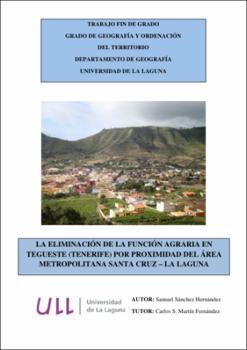La eliminación de la función agraria en Tegueste (Tenerife) por proximidad del área metropolitana Santa Cruz-La Laguna
Author
Sánchez Hernández, SamuelDate
2014Abstract
La estructura económica del municipio de Tegueste, al noreste de la isla de
Tenerife ha estado vinculada históricamente al sector agrario. Sin embargo, a partir de
la segunda mitad del siglo XX, este municipio inicia un progresivo proceso de pérdida
de suelo destinado a labores agrarias, vinculado a la necesidad de espacio residencial
que absorba la demanda del área metropolitana Santa Cruz – La Laguna. Esta pérdida
de suelo, ha estado condicionada por una serie de agentes: el planeamiento municipal, a
través de los distintos planes ejecutadas sobre el territorio, las infraestructuras viales,
mediante las mejoras de conectividad y la propia ejecución de las mismas sobre el suelo
agrario, y en tercer lugar, el precio del suelo, cambiante en función de su clasificación y
sus perspectivas de futuro planeamiento. Mediante estos tres agentes se ha tratado de
explicar la pérdida espacios agrarios en Tegueste, relacionada con la cercanía al área
metropolitana insular y la demanda de suelo residencial que ella genera en su
proximidad. Tegueste economy, northeast of the island of Tenerife, has been historically
linked to the agricultural sector. However, from the second half of the twentieth
century, this town started a gradual process of loss of land for agricultural, linked to the
need for residential space to absorb the demand of the metropolitan area Santa Cruz - La
Laguna.
This loss of soil has been conditioned by a range of actors: municipal planning,
through the various planning figures executed on the territory. The road infrastructure
through improved connectivity and the proper execution of the same on the agricultural
land, and thirdly, the price of land itself, changing depending on their classification and
their prospects for future planning. Through these three agents, has tried to explain the
loss in agricultural areas Tegueste related to the proximity to the insular metropolitan
area and the demand for residential land it generates in its proximity.




